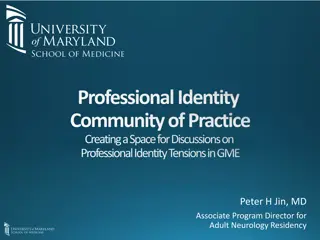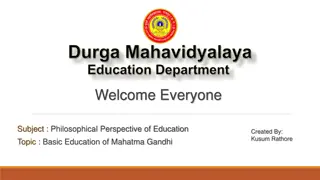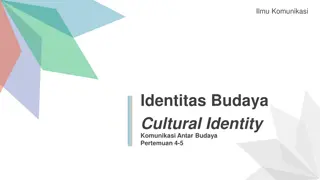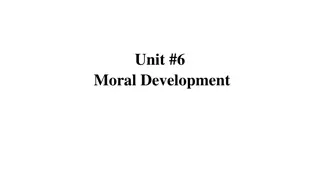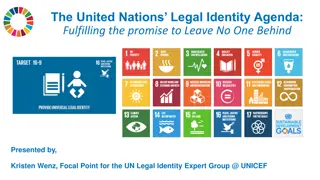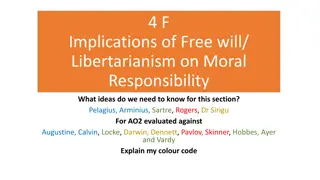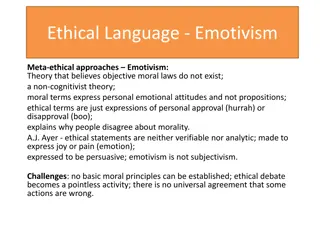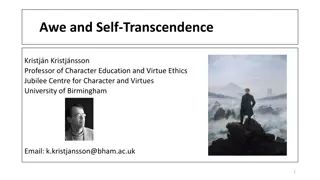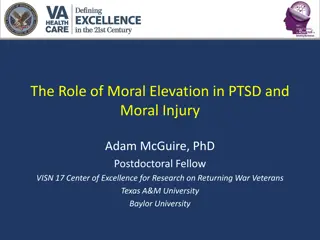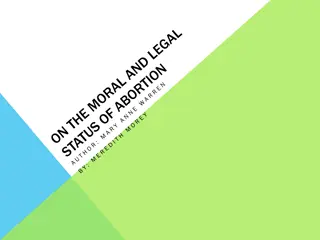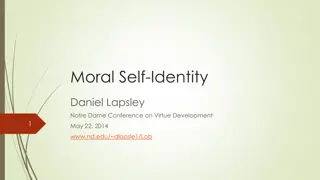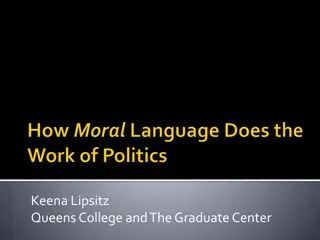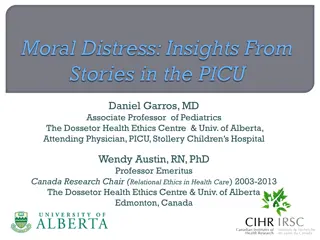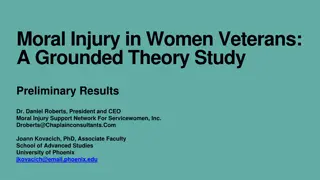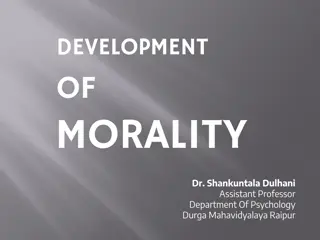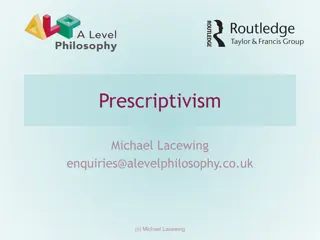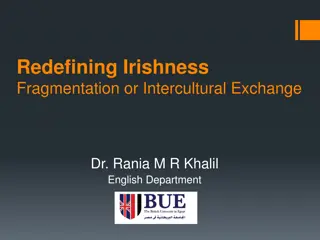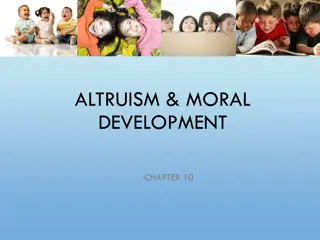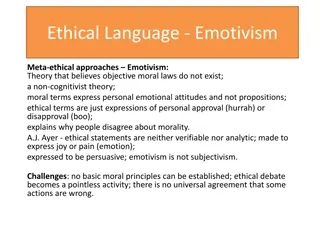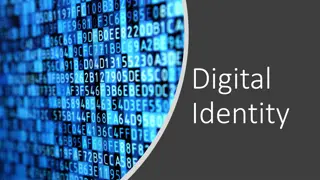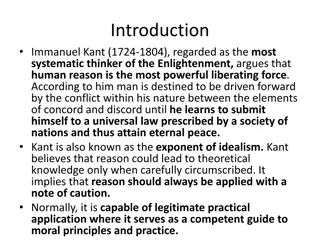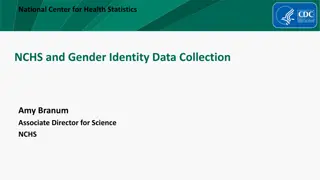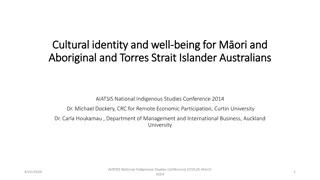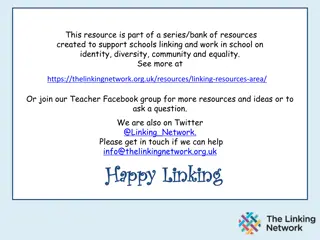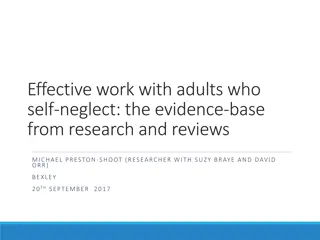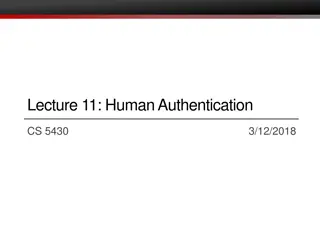Understanding Self-Worth in Children: Building a Strong Foundation
Explore the importance of self-concept, self-esteem, and self-worth in children's development. Learn how parents can positively impact a child's self-perception and self-value through nurturing experiences. Discover the key sources influencing children's self-worth and the critical role of early lif
0 views • 30 slides
Global Mobility and Legal Identity Strategy Presentation
Explore the significance of legal identity and global mobility in the context of migration and border management as presented by Mme. Mariama Mohamed Cisse, Director at IOM Special Liaison Office to the AU and ECA. The presentation addresses frameworks, principles, and strategies for ensuring legal
3 views • 14 slides
Professional Identity Community of Practice
This presentation discusses the formation of a Community of Practice focusing on professional identity tensions in Graduate Medical Education (GME). Dr. Peter H. Jin delves into sources of tension in GME trainees, professional identity formation, and the creation of a sustainable network for discuss
4 views • 5 slides
Durga Mahavidyalaya
Education is viewed as the acquisition of knowledge, skills, beliefs, and moral habits. Mahatma Gandhi introduced his Basic Education concept emphasizing free and compulsory education, mother tongue instruction, craft-centered learning, moral education, and character building. The curriculum include
0 views • 6 slides
United Nations Legal Identity Agenda and Civil Registration Guidelines
The United Nations Legal Identity Agenda aims to ensure legal recognition for all individuals through civil registration systems. This initiative, aligned with the 2030 Agenda for Sustainable Development, emphasizes birth registration and legal identity as fundamental rights. The agenda encompasses
1 views • 10 slides
Understanding Self-Esteem and Ways to Improve It
Self-esteem is our perception of ourselves, impacting how we navigate life. Healthy self-esteem fosters positivity, while low self-esteem can be detrimental. Various factors, like childhood experiences, contribute to low self-esteem, but steps can be taken to improve it. Building positive relationsh
0 views • 14 slides
Understanding Cultural Identity in Communication Studies
The importance of identity in communication is discussed in relation to cultural, racial, ethnic, gender, national, regional, organizational, personal, and cyber/fantasy identities. Identity development influences social roles and communication interactions. Various social identities shape our self-
1 views • 28 slides
Understanding Kohlberg's Stages of Moral Development
Kohlberg's stages of moral development, built upon Piaget's psychological theory, outline six developmental stages of moral reasoning, with each stage offering a higher level of response to moral dilemmas. Kohlberg focused on justice in moral development and emphasized the importance of how individu
0 views • 19 slides
Understanding Moral Development and Moral Reasoning
Moral development involves an individual's sense of right and wrong, influenced by family, school, friends, and societal environment. Children learn moral concepts from interactions with parents, teachers, peers, and society, shaping their understanding of good and bad. Additionally, moral reasoning
0 views • 13 slides
United Nations Legal Identity Agenda: Achieving SDG 16.9
The United Nations Legal Identity Expert Group (LIEG) aims to close the global legal identity gap by over 300 million within four years. The group focuses on implementing a life-cycle approach to legal identity, starting from birth, to ensure no one is left behind. The structure and strategy of LIEG
0 views • 10 slides
Moral Responsibility and Free Will Implications in a Contemporary Context
This text delves into the implications of free will and libertarianism on moral responsibility, examining the ideas of various philosophers and thinkers such as Pelagius, Arminius, Sartre, and more. It explores the concepts of moral agency, determinism, normative ethics, religious beliefs, and the c
5 views • 12 slides
Understanding Emotivism in Ethical Philosophy
Emotivism is a meta-ethical theory that rejects objective moral laws, instead positing that moral terms express personal emotional attitudes, not universal truths. Influenced by A.J. Ayer and rejecting naturalism, this theory suggests that ethical statements are not objective propositions but rather
0 views • 28 slides
The Importance of Digital Identity in Modern Society
Digital identity plays a crucial role in modern society by enabling secure online services and verification processes. Identity management forms the foundation for moving services online, providing a means to verify individuals in a completely digital environment. The Pan-Canadian Trust Framework fo
0 views • 16 slides
Understanding Young Adult Literature and Identity Formation
Young Adult literature caters to readers aged 12-18, exploring themes of adolescence, individuation, and identity formation. This genre faces challenges due to evolving definitions and adult readership. Characters navigate the journey of self-discovery, integrating self and community while examining
2 views • 9 slides
Challenges and Opportunities of Moral Revolution in Indonesia
The need for a moral revolution in Indonesia to address societal issues like corruption, conflict, and intolerance. Contrasting mental and moral revolutions, the focus is on behavior change to build a humane society with healthy moral values. Initiatives and discussions highlight the urgency of tran
0 views • 13 slides
Understanding Mindful Self-Judgment and Its Role in Mental Health
Mindful self-judgment is a complex concept that involves balancing self-awareness and self-compassion. While nonjudgment is a key aspect of mindfulness practices, there is a debate on whether mindful self-judgment can be appropriate and functional in certain circumstances. Researchers like June Pric
2 views • 46 slides
Exploring Awe and Self-Transcendence in Moral Character and Selfhood
Delve into the relationship between emotions, personality, and the self, with a focus on awe as a key emotion shaping moral character and selfhood. Discover its conceptual nuances, moral significance, and impact on ethical decision-making, generosity, and prosocial behaviors. Uncover the interconnec
0 views • 25 slides
Understanding Moral Elevation in PTSD and Moral Injury
The research by Dr. Adam McGuire explores the role of moral elevation in PTSD and moral injury, emphasizing how witnessing virtuous behaviors triggers emotional and physical responses leading to a desire for imitating virtuous acts. By integrating prosocial emotions into trauma treatment, the positi
0 views • 13 slides
Understanding Humanity and Moral Community in the Context of Abortion Ethics
Exploring the complex ethical considerations surrounding abortion, this discussion delves into determining the humanity of a being, defining the moral community based on traits of personhood, fetal development, and the right to life. The arguments include the morality of abortion, the definition of
0 views • 9 slides
Challenges to Moral Anti-Realism: Objections and Responses
The article explores objections to moral anti-realism, including moral nihilism, condemning immorality, and the notion of moral progress in the absence of moral reality. It addresses concerns about the justification for interfering with others' behavior, the relationship between moral beliefs and ob
0 views • 6 slides
Understanding Moral Self-Identity Development
Situating moral self-identity within ethical theory and developmental psychology, this overview explores the centrality of morality within the self-concept. It discusses the chronic accessibility of moral schemas, the importance of strong evaluation in moral behavior, and the connection between mora
0 views • 33 slides
Understanding Moral and Constitutional Values in Relation to Judiciary
Explore the concepts of moral values and constitutional values, emphasizing their importance in decision-making processes and societal norms. Discover the stages of moral development and delve into constitutional values such as sovereignty, socialism, secularism, democracy, justice, liberty, equalit
0 views • 9 slides
Analysis of Moral Language in Political Communication
Explore how Republican and Democratic elites use distinctive moral language and its impact on voters in the context of the 2012 election data. Discover the application of Moral Foundations Theory in understanding political differences in the United States and how moral intuitions influence public op
0 views • 13 slides
The Influence of Disgust on Moral Behavior in Psychological Research
Explore the impact of disgust on moral behavior through various studies, including moral dilemmas and criteria for moral judgment. Research delves into how disgust affects decision-making processes related to moral dilemmas and helping behavior. Discover the connection between physical disgust and i
0 views • 16 slides
Understanding Moral Distress in Healthcare
This content discusses the concept of moral distress in healthcare, defined as the pain and anguish experienced when one knows the right thing to do but faces internal or external barriers preventing action. It explores the implications of moral distress on healthcare practitioners and emphasizes th
0 views • 25 slides
Insights on Moral Injury Among Women Veterans: Preliminary Study Findings
Preliminary results from a grounded theory study on moral injury in U.S. women veterans reveal themes such as sexual assault, hostile work environments, and more. Participants shared their experiences, highlighting the nature of moral injury they faced, distinguishing between various forms of discri
0 views • 21 slides
Understanding Moral Development: Insights and Perspectives
Morality is the belief in right behavior accepted by society. It involves moral behavior, feelings, and judgments. Moral development evolves from childhood to adulthood, influenced by experiences and challenges. Freud's id, ego, and superego theory and Skinner's behaviorism contribute to our underst
0 views • 12 slides
Exploring Moral Judgments and Prescriptive Meaning in Ethics
This content delves into non-cognitivism, Hare’s prescriptivism, and moral anti-realism to understand what we do when making moral judgments. It discusses prescriptive meaning, the concept of good, and how moral language guides actions. The objections raised regarding moral language's functions, p
0 views • 9 slides
Redefining Irish Identity in a Globalized World
Exploring the complexities of Irish identity in a post-colonial, globalized society through the lenses of cultural fragmentation, intercultural exchange, and the evolving narratives of contemporary Irish playwrights. The discourse delves into the challenges of maintaining a distinct Irish identity w
2 views • 15 slides
Understanding Altruism and Moral Development Theories
Explore the components of morality, theories of moral development by prominent psychologists like Piaget and Kohlberg, and the stages of moral development in individuals. Learn about moral affect, reasoning, and behavior as integral aspects shaping one's ethical framework and decision-making process
0 views • 40 slides
Friedrich Nietzsche's Genealogy of Morals: Uncovering the Evolution of Moral Values
Friedrich Nietzsche critiques traditional philosophy for overlooking the historical development of moral concepts. He argues that moral judgments were initially based on strength and power, later evolving into the dichotomy of master and slave morality. By tracing the genealogy of moral terms, Nietz
0 views • 10 slides
Understanding Emotivism: A Non-Cognitivist Theory in Ethics
Emotivism is a meta-ethical theory that posits the absence of objective moral laws, suggesting moral terms express personal emotional attitudes rather than propositions. Influenced by philosophers like A.J. Ayer and Hume, it challenges the existence of basic moral principles and universal agreement
0 views • 23 slides
Understanding Digital Identity in the Modern Age
Exploring the concept of digital identity, this content delves into the various forms it takes, such as personal information and online behaviors. It discusses the learning outcomes related to digital identity in educational settings, including analyzing bias in digital texts and understanding emplo
0 views • 7 slides
Kant's Moral Philosophy: Reason, Freedom, and the State
Immanuel Kant, a prominent Enlightenment thinker, emphasizes the liberating power of human reason in guiding individuals towards moral principles and practices. Kant's moral philosophy centers on treating each person as an end-in-itself, driven by the good will informed by reason. His concept of mor
0 views • 14 slides
Importance of Gender Identity Data Collection in Health Surveys
Gender identity data collection is crucial for identifying health disparities among marginalized groups. National Center for Health Statistics (NCHS) emphasizes the need to include questions on sexual orientation and gender identity in surveys to address health equity. Initiatives like the NCHS Heal
0 views • 20 slides
Exploring Cultural Identity and Well-being Among Indigenous Australians
This study delves into the intricate relationship between cultural identity and well-being among Māori and Aboriginal/Torres Strait Islander Australians. It examines the impact of colonialism on identity, emphasizing the importance of connections to land, family, and kinship systems in shaping iden
0 views • 13 slides
Identity and Community Exploration in School: TLN Identity Pack Lesson
Engage students in exploring identity, diversity, uniqueness, and community with the TLN Identity Pack Lesson series. Through discussions and activities, students reflect on the meaningful people in their lives and how interactions shape identity. Utilize resources and prompts to facilitate insightf
0 views • 15 slides
Understanding Self-Neglect in Adults: Challenges and Research Insights
This content delves into the complex issue of self-neglect in adults, covering its definition, key challenges, and the research evidence available. It explores the various aspects of self-neglect, including neglect of self-care, domestic environment, and refusal of services. The challenges associate
0 views • 39 slides
Understanding Human Authentication and Digital Identity
Explore the complexities of human authentication, classes of countermeasures, principles, personal and digital identity, and aspects of digital identity. Dive into the philosophical problem of personal identity, different types of identities, attributes, identifiers, verifiers, and the process of id
0 views • 33 slides
Forms of Moral Reasoning and Ethics in Decision-Making
Explore the main forms of moral reasoning in ethical decision-making, including virtue ethics, deontological reasoning, and teleological reasoning. Understand the importance of developing ethical virtues and principles in guiding behavior. Delve into examples of reasoning from virtue and deontologic
0 views • 28 slides


